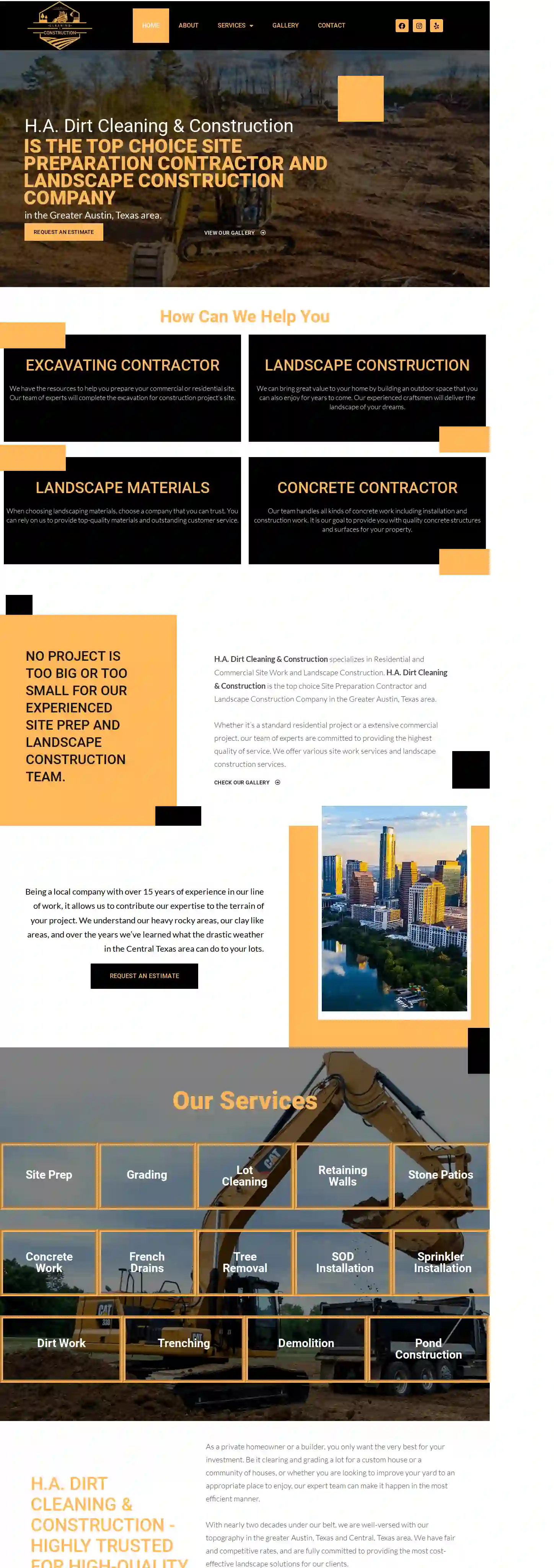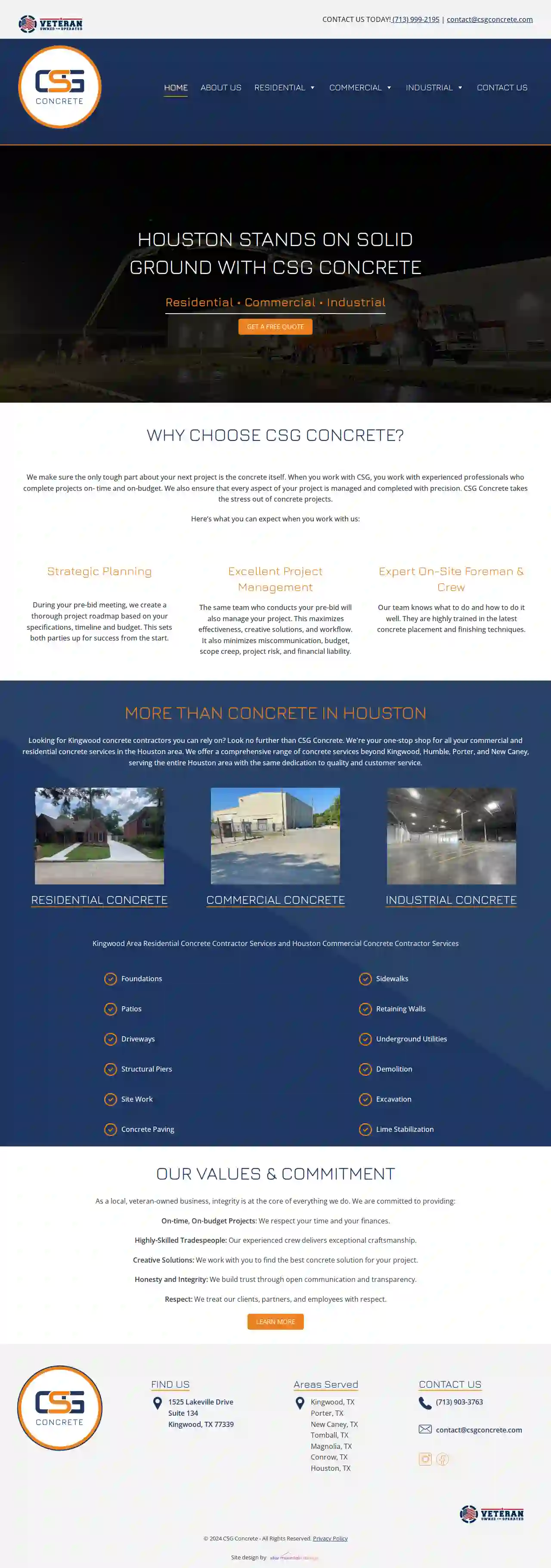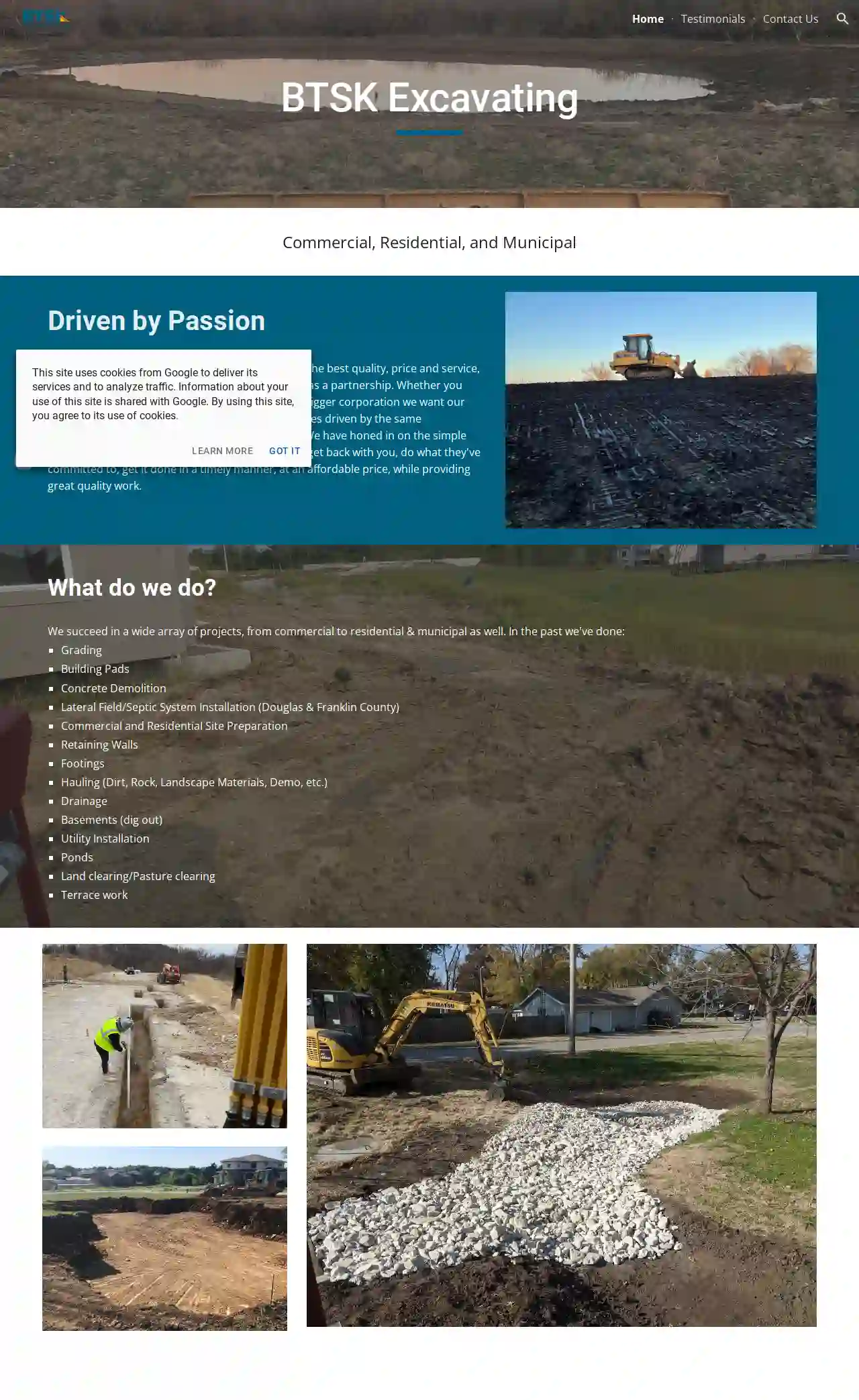Demolition Contractors Kingsland
Find Structure Demolition in Kingsland
Receive multiple Structure Demolition quotes for your project today! Compare profiles, reviews, accreditations, portfolio, etc... and choose the best service.

Forest Laine Excavation
54 reviewsSpring, USForest Laine Excavation: Your Trusted Partner for Grading and Excavation in Middle Tennessee Forest Laine Excavation is a premier grading and excavation company serving the Middle Tennessee area. Our team of experts specializes in both residential and commercial projects, providing top-notch services to meet the needs of our clients. We pride ourselves on our extensive knowledge and experience in the field, as well as our attention to detail. Our team is dedicated to delivering high-quality workmanship and exceptional customer service on every project we undertake. We have a proven track record of success, having completed numerous projects for both residential and commercial clients. Our team is committed to delivering exceptional results, no matter the size or scope of the project.
- Services
- Why Us?
- Testimonials
- Gallery
Get Quote
H.A. Dirt Cleaning & Construction
511 reviewsAustin, USH.A. Dirt Cleaning & Construction is the top choice Site Preparation Contractor and Landscape Construction Company in the Greater Austin, Texas area. H.A. Dirt Cleaning & Construction specializes in Residential and Commercial Site Work and Landscape Construction. Whether it’s a standard residential project or a extensive commercial project, our team of experts are committed to providing the highest quality of service. We offer various site work services and landscape construction services. Being a local company with over 15 years of experience in our line of work, it allows us to contribute our expertise to the terrain of your project. We understand our heavy rocky areas, our clay like areas, and over the years we’ve learned what the drastic weather in the Central Texas area can do to your lots. As a private homeowner or a builder, you only want the very best for your investment. Be it clearing and grading a lot for a custom house or a community of houses, or whether you are looking to improve your yard to an appropriate place to enjoy, our expert team can make it happen in the most efficient manner. With nearly two decades under our belt, we are well-versed with our topography in the greater Austin, Texas and Central, Texas area. We have fair and competitive rates, and are fully committed to providing the most cost-effective landscape solutions for our clients. You can rest assured that your project will be completed in a timely manner and with professionalism and outstanding customer service. No project is too big or too small for our experienced site prep and landscape construction team.
- Services
- Why Us?
- Gallery
Get Quote
CSG Concrete
511 reviews1525 Lakeville Drive, Suite 134, Kingwood, 77339, USHouston Stands on Solid Ground with CSG Concrete Residential • Commercial • Industrial Get a Free Quote Why Choose CSG Concrete? We make sure the only tough part about your next project is the concrete itself. When you work with CSG, you work with experienced professionals who complete projects on-time and on-budget. We also ensure that every aspect of your project is managed and completed with precision. CSG Concrete takes the stress out of concrete projects. Here’s what you can expect when you work with us: Strategic Planning During your pre-bid meeting, we create a thorough project roadmap based on your specifications, timeline and budget. This sets both parties up for success from the start. Excellent Project Management The same team who conducts your pre-bid will also manage your project. This maximizes effectiveness, creative solutions, and workflow. It also minimizes miscommunication, budget, scope creep, project risk, and financial liability. Expert On-Site Foreman & Crew Our team knows what to do and how to do it well. They are highly trained in the latest concrete placement and finishing techniques. More Than Concrete in Houston Looking for Kingwood concrete contractors you can rely on? Look no further than CSG Concrete. We're your one-stop shop for all your commercial and residential concrete services in the Houston area. We offer a comprehensive range of concrete services beyond Kingwood, Humble, Porter, and New Caney, serving the entire Houston area with the same dedication to quality and customer service. RESIDENTIAL CONCRETE COMMERCIAL CONCRETE INDUSTRIAL CONCRETE Kingwood Area Residential Concrete Contractor Services and Houston Commercial Concrete Contractor Services Foundations Patios Driveways Structural Piers Site Work Concrete Paving Sidewalks Retaining Walls Underground Utilities Demolition Excavation Lime Stabilization Our Values & Commitment As a local, veteran-owned business, integrity is at the core of everything we do. We are committed to providing: On-time, On-budget Projects: We respect your time and your finances. Highly-Skilled Tradespeople: Our experienced crew delivers exceptional craftsmanship. Creative Solutions: We work with you to find the best concrete solution for your project. Honesty and Integrity: We build trust through open communication and transparency. Respect: We treat our clients, partners, and employees with respect. Learn more
- Services
- Why Us?
- Gallery
Get Quote
Texas Excavation Company
58 reviews5719 TX-276, Royse City, 75189, USTexas Excavation Company: Your Reliable Excavation Expert As excavation contractors, we are responsible for site preparation for construction. We oversee changing the landscape by moving dirt, rocks, trees, and more, typically using a wide range of heavy machinery. These efforts are a part of a careful and well-engineered process designed to create a firm basis from which any building or other type of project can begin. Our mission is to facilitate damage prevention, promote public safety, and protect the environment through stakeholder education and communication.
- Services
- Why Us?
- Testimonials
- Gallery
Get Quote
Shangri-La Springs
4.7259 reviewsShangri-La Springs, Bonita Springs, Florida 34135 USA, 27750 Old 41 Rd, 34135, USOur History The history of the springs begins hundreds of years ago with the Calusa Indians who were the original inhabitants of this area. They used the mineral spring water for medicinal and trading purposes. Then, in the early 1500s, Juan Ponce De Leon discovered the spring in his quest for the Fountain of Youth. Although he never found it, many believed the natural mineral waters running through the spring have special healing properties. This natural mineral spring, which is still flowing on the property today, is the very spring for which the city was named – Bonita Springs. Gilmer Heitman The history of Shangri-La Springs starts in 1921 when Gilmer Heitman, considered to be a visionary of Bonita Springs, constructed The Heitman Hotel with 25 rooms along Heitman Avenue, now known as Old 41 Road. The hotel was built as a place to stay for home buyers during construction of their house. The Heitman Hotel In 1935, the hotel was sold to Robert and Bess DeFoor for $6,000. But the hotel fell on hard times during the depression and the DeFoor’s sold the property to the Haverfields who expanded the hotel to 50 rooms and changed the name to the Bonita Springs Hotel. Walter A. Mack Walter A. Mack, owner Mack Cadillac Corporation in Chicago, then purchased the property and his financial means afforded extensive upgrades. He changed the name to Villa Bonita and added access to a beachfront cabana club on Hickory Island near what we now know as Barefoot Beach. Dr. Charles Gnau The next owner was Dr. Charles Gnau. Dr. Gnau was an osteopath and a believer in the healing powers of the mineral water springs. And it was he who is responsible for the installation of the spring-fed pool with a statue named the Indian Maid of the Springs which is still on the property today. Dr. R.J. Cheatham In 1963, the property was sold to a neuropath, Dr. R .J. Cheatham. Dr. Cheatham changed the name of the hotel to Shangri-La invoking the image of the pathway to paradise as described in the novel Lost Horizon. Under Cheatham’s direction, the hotel became an institute devoted to the practices of natural hygiene. Leo Dahlman In 1993, Leo Dahlman bought the property with the goal of developing Shangri-La Springs into a first class health resort. With a background in historic restoration and hotel management, he restored much of the property to its original grandeur. But, the property fell into foreclosure and became available for purchase in 1998. The Current Owners The current owners, Lama Hana
- Services
- Why Us?
- Gallery
Get Quote
Arborlogical Inc.
546 reviewsAmarillo, TX, 79124, USFind a Tree Care Company You Can Trust Partner with us in Amarillo & Lubbock, TX Contact Us We'll Go Out on a Limb for You Make us your preferred tree care company in Amarillo & Lubbock, TX. Arborlogical is a certified and TCIA accredited tree care company serving Amarillo & Lubbock, TX. We have 23 years of experience providing fast and dependable tree services at the highest level. Whether you need us to remove hazardous tree branches or prevent the spread of disease, we can help strengthen your trees with our proven and effective methods. Call 806-354-6733 or 806-771-8733 now to speak with our tree care company. See what we can do for you Here at Arborlogical, we can complete a wide range of projects for our residential, commercial and municipal clients. You can depend on us for: Tree services - including deep root fertilization, tree removal and tree pruning Shrub services - including shrub trimming, pruning and disease treatment Lawn services - including lawn seeding, weed control and insect management We'll make sure that your property is well cared for. Connect with us soon to schedule shrub, lawn or tree services in Amarillo & Lubbock, TX. Revitalize Your Struggling Trees With Deep Root Fertilization Take advantage of our proven and effective tree services Trees → We'll help your trees reach new heights. Shrubs → We'll shape and prune your shrubs to perfection. Lawn → Learn how we can improve the health of your lawn. Contact Us → You can reach us here to schedule your next service. Serving Residential, Commercial and Municipal Clients We're the team that local community members trust most Contact Us Today Leave us a Review
- Services
- Why Us?
- Gallery
Get Quote
Grant Renne & Sons Inc
4.853 reviews1200 8th Street, Kansas City, 64106, USGrant Renne & Sons Inc. - Protecting Your Biggest Asset Since 1873 Grant Renne & Sons Inc. is a family-owned and operated business that has been serving the Kansas City area for over 150 years. We are the 6th oldest company in Kansas City and have a long history of providing quality foundation repair and waterproofing services. We are committed to providing our customers with the best possible service and value. We are proud to be a part of the Kansas City community and are committed to giving back to the community that has supported us for so many years. We offer a wide range of services to meet your needs, including: Foundation Piering Mudjacking Retaining Walls Tuck Pointing Foundation Releveling Crack Repair Sump Pumps Chimney Piering Waterproofing Exterior Drainage Systems Basement Wall Replacement Bowing Basement Walls We are committed to providing our customers with the highest quality service and value. We use only the best materials and techniques to ensure that your foundation is repaired correctly and that your home is protected from future damage. We are also committed to providing our customers with a positive experience. We are always available to answer your questions and address your concerns. We are confident that you will be satisfied with our services. We are proud to be a part of the Kansas City community and are committed to giving back to the community that has supported us for so many years. We are active members of the Kansas City Chamber of Commerce and the Better Business Bureau. We are also proud to support local charities and organizations.
- Services
- Why Us?
- Testimonials
- Gallery
Get Quote
Cains Construction
524 reviews807 West 30th Terrace, Lawrence, 66046, USCain’s Construction: Your Premier Source of Landscaping and Concrete Services Cain’s Construction is a leading landscaping and hardscaping company serving property owners in the greater Lawrence, KS area. We offer a wide range of services, including gravel driveways, patio installs, excavation projects, retaining wall and drainage services, and demolition services. Our team of professionals is dedicated to providing the highest quality service and ensuring customer satisfaction. We understand that your lawn, landscape, and walkways are the first impression of your home. That's why we're committed to creating beautiful and functional outdoor spaces that will impress your guests and add value to your property. We have the experience, equipment, and knowledge to manage soil and drainage, create retaining walls to protect your property from water damage, and complete any excavation or demolition project you may have. Whether you need a new patio, driveway, or sidewalk, or you're looking to clear your property of unwanted structures, Cain’s Construction is the team to call. We work closely with our clients to ensure that their projects are completed on time and within budget. We're proud to provide friendly service and exceptionally beautiful landscapes. Contact us today to discuss your project and request a free estimate!
- Services
- Why Us?
- Testimonials
- Gallery
Get Quote
Blue Moon Hauling
4.79 reviews13402 North Virginia Avenue, Smithville, 64089, USBlue Moon Hauling & Excavation: Your Trusted Partner for Site Work Centrally located in Smithville, Missouri, Blue Moon Hauling and Excavation LLC has been providing competitively priced, professional, and timely service to our clients and construction partners for over two decades. We're experts in excavation and hauling, and our knowledge can make the difference between a successful project and a costly one. We're fully bonded and licensed, and our goal is to keep your project moving efficiently with quality, safety, and the bottom line in mind. Meet Joel Krull, Owner and Founder Joel Krull, the owner and founder of Blue Moon Hauling, brings over 12 years of experience as a Field Superintendent on large commercial projects to the table. He's a member of the Kansas City Builders' Association, has completed the Army Corp of Engineers Supervisory Training Program, and is certified by the U.S. Army Corp of Engineers as a Quality Construction Manager. Blue Moon Hauling has been in business since 1998, starting as a trucking company and expanding to encompass all aspects of site work. We perform building demolition, site demolition, clearing & grubbing, mass excavation, grading, site water utilities, site storm utilities, and site sanitary utilities. We work with both the commercial and municipality sectors, contracting as both a general contractor and a sub-contractor. Our team of operators, laborers, and office staff are dedicated to delivering quality, safety, and efficiency on every project.
- Services
- Why Us?
- Gallery
Get Quote
BTSK EXCAVATING, LLC
4.86 reviewsPO Box 762, Baldwin City, 66006, USDriven by Passion We started this company with a passion to provide the best quality, price and service, which our customers deserve. We see each project as a partnership. Whether you are a homeowner, fellow small business owner, or bigger corporation we want our customers to see that passion and see our employees driven by the same commitment to excellence we promise to provide. We have honed in on the simple things that customers desire: a contractor that will get back with you, do what they've committed to, get it done in a timely manner, at an affordable price, while providing great quality work. What do we do? We succeed in a wide array of projects, from commercial to residential & municipal as well. In the past we've done: Grading Building Pads Concrete Demolition Lateral Field/Septic System Installation (Douglas & Franklin County) Commercial and Residential Site Preparation Retaining Walls Footings Hauling (Dirt, Rock, Landscape Materials, Demo, etc.) Drainage Basements (dig out) Utility Installation Ponds Land clearing/Pasture clearing Terrace work
- Services
- Why Us?
- Testimonials
- Gallery
Get Quote
Over 22,076+ Excavation Companies onboarded
Our excavation contractors operate in Kingsland and surrounding areas!
ExcavationHQ has curated and vetted the Best Excavation Contractors near Kingsland. Find a reliable contractor today.
Frequently Asked Questions About Demolition Contractors
- Experience: Look for companies with a proven track record and years of experience in the demolition industry.
- Licensing and Insurance: Ensure the contractor is properly licensed to operate in your area and carries adequate insurance to protect you from liability.
- Safety Record: Inquire about their safety protocols and accident history. A reputable contractor prioritizes safety.
- References and Reviews: Ask for references from past clients and check online reviews to gauge their reputation and customer satisfaction.
- Professionalism: Choose a company that communicates clearly, provides detailed estimates, and has a courteous and responsive team.
- Feasibility Studies: Assessing the viability and challenges of a demolition project.
- Demolition Planning: Developing demolition plans, including method selection, sequencing, and safety procedures.
- Permitting Assistance: Navigating the demolition permitting process and ensuring compliance with regulations.
- Hazardous Material Surveys: Identifying and managing hazardous materials, such as asbestos and lead paint.
- Cost Estimating: Providing accurate cost estimates for demolition services.
- Project Management: Overseeing the demolition process and ensuring it proceeds as planned.
- Project Assessment: The demolition contractor evaluates the structure, site conditions, and project requirements.
- Permitting: Obtain necessary demolition permits from local authorities.
- Site Preparation: Secure the site, disconnect utilities, and remove any valuable or reusable items.
- Hazardous Material Abatement: Professionally remove asbestos, lead paint, or other hazardous materials if present.
- Demolition: Execute the chosen demolition method, bringing down the structure safely and efficiently.
- Debris Removal and Site Cleanup: Sort, process, and dispose of demolition debris responsibly. Clean up the site to prepare it for future use.
- General Liability Insurance: Covers bodily injury or property damage to third parties caused by the contractor's negligence.
- Workers' Compensation Insurance: Provides benefits to workers injured on the job.
- Pollution Liability Insurance: Covers costs associated with environmental contamination caused by demolition activities.
- Professional Liability Insurance: Protects against claims of negligence or errors in professional services, such as demolition planning or consulting.
How do I find a reputable demolition contractor?
What is the role of a demolition consultant?
What are the steps involved in a typical demolition process?
What is the importance of insurance in demolition projects?
How do I find a reputable demolition contractor?
- Experience: Look for companies with a proven track record and years of experience in the demolition industry.
- Licensing and Insurance: Ensure the contractor is properly licensed to operate in your area and carries adequate insurance to protect you from liability.
- Safety Record: Inquire about their safety protocols and accident history. A reputable contractor prioritizes safety.
- References and Reviews: Ask for references from past clients and check online reviews to gauge their reputation and customer satisfaction.
- Professionalism: Choose a company that communicates clearly, provides detailed estimates, and has a courteous and responsive team.
What is the role of a demolition consultant?
- Feasibility Studies: Assessing the viability and challenges of a demolition project.
- Demolition Planning: Developing demolition plans, including method selection, sequencing, and safety procedures.
- Permitting Assistance: Navigating the demolition permitting process and ensuring compliance with regulations.
- Hazardous Material Surveys: Identifying and managing hazardous materials, such as asbestos and lead paint.
- Cost Estimating: Providing accurate cost estimates for demolition services.
- Project Management: Overseeing the demolition process and ensuring it proceeds as planned.
What are the steps involved in a typical demolition process?
- Project Assessment: The demolition contractor evaluates the structure, site conditions, and project requirements.
- Permitting: Obtain necessary demolition permits from local authorities.
- Site Preparation: Secure the site, disconnect utilities, and remove any valuable or reusable items.
- Hazardous Material Abatement: Professionally remove asbestos, lead paint, or other hazardous materials if present.
- Demolition: Execute the chosen demolition method, bringing down the structure safely and efficiently.
- Debris Removal and Site Cleanup: Sort, process, and dispose of demolition debris responsibly. Clean up the site to prepare it for future use.
What is the importance of insurance in demolition projects?
- General Liability Insurance: Covers bodily injury or property damage to third parties caused by the contractor's negligence.
- Workers' Compensation Insurance: Provides benefits to workers injured on the job.
- Pollution Liability Insurance: Covers costs associated with environmental contamination caused by demolition activities.
- Professional Liability Insurance: Protects against claims of negligence or errors in professional services, such as demolition planning or consulting.